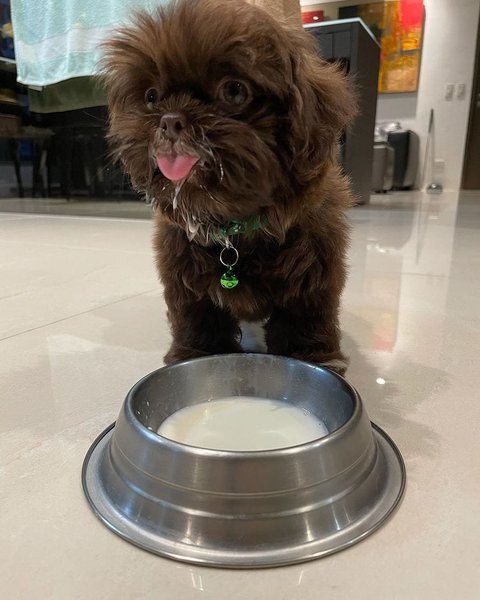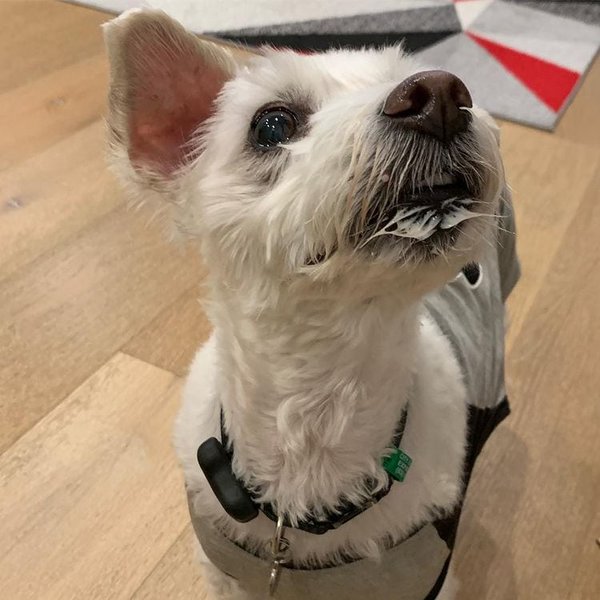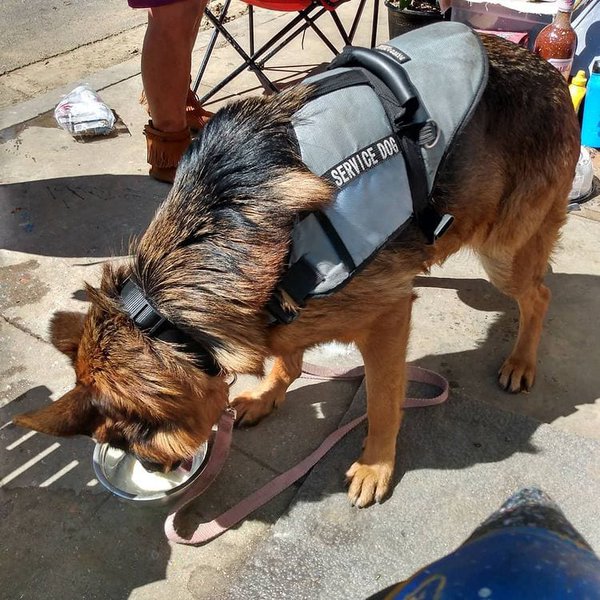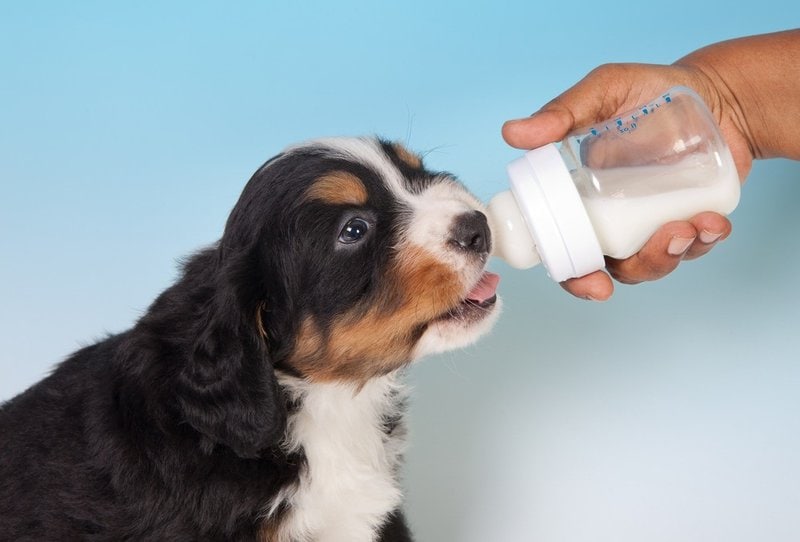The question of whether or not it is ok to give dogs milk is one that every dog owner has had to maul over at some point. There are just as many sources and experts who say that it is ok as there are who completely warn against it. So which is it? Is milk safe for dogs?
Dogs can drink milk safely as long as they are not lactose intolerant. However, moderation is crucial even for these few doggies that are lucky enough not to be allergic to milk.
To help you better understand the relationship between milk and dogs, and most importantly the risks involved, here are the answers to the most commonly asked questions on the matter.
Can Dogs Drink Milk?
Some dogs can drink milk while others can’t. For the dog’s safety and well-being, it is best to avoid milk completely until you are sure about their lactose tolerance status.
When it comes to confirming whether or not your dog is lactose intolerant, there are several ways to do it. The different methods often involve giving the dog some milk while under the care and observation of a veterinarian.
One option to confirm lactose intolerance in the dog is known as the hydrogen breath test. This is a general test used to assess for undigested components of a meal and is rarely used.
The more commonly used method to assess for lactose intolerance in dogs is by checking for signs and symptoms of the same after a small amount of milk is consumed.
In the event that your pooch is not lactose intolerant, you can safely add small amounts of milk to their diet moving forward.
What Will Happen If A Dog Drinks Milk?

Most dogs suffer from lactose intolerant and will suffer indigestion once they consume milk. It usually does not matter how much milk they consume and as little as a tablespoon could cause problems for the dog.
An episode of lactose intolerance can be as simple as some mild discomfort or it can be serious enough to cause life-threatening complications. Here are a few signs and symptoms to look out for after your dog consumes milk that should concern you.
Resistance To Handling And Reduced Appetite
Dogs typically resist handling when they are uncomfortable and this is to be expected with lactose intolerance if your dog takes milk or dairy products. They will be particularly sensitive to touch around the torso area and may seclude themselves to avoid discomfort.
The pain is caused by a combination of bloating and actual irritation of the gastric and intestinal mucosa. This may also manifest as reduced appetite for the dog as any more food will just worsen the discomfort for them.
Bloating
Bloating is probably the most common sign of lactose intolerance in dogs. Their inability to digest milk proteins adequately results in the overproduction of gaseous waste products. These build up in the digestive tract and may cause your dog a lot of discomforts.
Bloating is of particularly great concern for dogs that have an increased risk of developing gastric dilatation volvulus. This is a condition where the stomach twists on itself due to filling up with things like gas or food. If not addressed promptly, this volvulus can be fatal.
Diarrhea
The products that result from inadequate digestion of dairy in lactose-intolerant dogs are very irritative to the digestive tract mucosa. This irritation causes a sort of “leaky gut” effect and is marked by frequent and often watery diarrhea. This will go on until all the milk or dairy products, as well as their toxic byproducts, are eliminated.
Excessive Thirst
Excessive thirst in an episode of lactose intolerance is usually an ominous sign that points to complications of excessive diarrhea including dehydration. In very severe or prolonged cases, chronic dehydration puts the dog’s kidneys at risk of failure.
This is why it is so important to keep your dog well hydrated when you notice they consumed milk or other dairy products and are having a bad reaction.
What Should I Do If My Dog Accidentally Drinks Milk?

Your first move as soon as you notice that your dog has consumed milk is to call your vet. Depending on how much the dog took as well as the type and severity of their signs and symptoms, you may have to take the dog physically to the vet.
Emergency veterinarian care is particularly important to help prevent dehydration as well as to deal with life-threatening complications like volvulus and kidney failure.
In the event that the reaction to milk or dairy products is mild and your vet simply recommends that you wait watchfully from home, there is a lot that you can do to help your dog recover. Here are a few key tips and tricks.
Hydrate Your Dog Constantly
Your dog will be losing a lot of fluids through diarrhea. In those cases where the signs also include vomiting, you have to start paying more attention to your pooch.
That is why it is so important to ensure that you keep your pooch constantly hydrated.
Simply putting out a bowl of fresh water in an easily accessible spot should be enough. You could also give the dog soothing ice chips.
With time, you can mix in some bone soup or broth to make the dog more interested in the water while also replenishing some of the lost nutrients and electrolytes.
Reintroduce Meals In Small Amounts
The discomfort from lactose intolerance will almost inevitably affect your dog’s appetite. However, a healthy diet is crucial for their recovery. Once your dog seems more open to meals, make sure to reintroduce the food in small amounts.
Remember that their gut has taken a bit of a beating and need to have it easy for a while. It is best to split up their daily meal portions to 2 times the number of meals they would have before.
For example, if your pooch has 1 cup of dog food split into 2 meals a day, you could try to go with the same cup or a little less split over 4 meals during the day.
You could also try free feeding for a while so the dog can eat only when they feel comfortable and ready.
Stick To Mildly-Flavored And Light Meals
While we are still on the topic of reintroducing meals after your dog suffered from lactose intolerance, we recommend that you restart meals with mildly-flavored options. The trio of boiled chicken, rice, and vegetables like pumpkin is one that you can never go wrong with.
Other meat options include fish which should either be baked or steamed and served unseasoned.
What Kind Of Milk Can Dogs Drink?
For the most part, dogs can pretty much drink any kind of milk as long as they are not allergic to the milk source. It helps to consult a vet for further testing in controlled conditions to avoid having to deal with serious allergic reactions.
Let’s take a closer look at some of the options and the benefits that the different kinds of milk have to offer your dog.
Nut Milk
Milk produced from different types of nuts like cashews and almonds is a great source of protein and healthy fats. They also tend to be rich in antioxidants which are great for the dog’s health.
The best part is that plant-based milk extracted from nuts rarely causes allergic reactions and is, therefore, a great option for dogs with lactose intolerance.
The best options, in this case, are cashew and almond milk.
On the other hand, milk from walnuts or macadamia nuts should completely be avoided as they are both very toxic to dogs.

Animal Milk
Goat’s milk is a far superior option to cow’s milk. It is less likely to cause reactions associated with lactose intolerance and therefore ideal for dogs with more sensitive stomachs. However, it is important to note that your dog may still be allergic to goat’s milk.
What makes animal milk sources stand out as an option for dogs is their high probiotic content. This will help to improve the dog’s digestive functionality and overall health and wellbeing.
Soy Milk
Soy milk is another source of plant-based milk that is commonly implicated in dog allergies. However, for those that can tolerate it, soy milk has a lot to offer. It is a source of vitamins, minerals, and antioxidants that will help keep your pooch strong and healthy.
Another concern you may have to factor in when it comes to feeding your dog soy milk is the fact that most commercial preparations include a lot of artificial additives. These include sweeteners like xylitol that are toxic to dogs.
So read the label carefully before buying soy milk for your dog or better yet, make your own soy milk at home.
The most important thing is to ensure that your dog is not allergic to soy milk before serving it to them.





